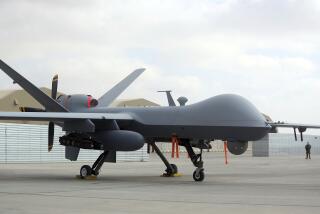Top NATO Target: Serb Air Defense : Military: U.N. revamps command structure, gives military officials power to call air strikes to protect Gorazde.
- Share via
WASHINGTON — The Bosnian Serbs’ sophisticated air-defense system will be the first target of NATO bombers if rebel Serbs try to overrun the U.N.-designated “safe area” of Gorazde in Bosnia-Herzegovina, U.S. officials said Wednesday.
Such action became possible when U.N. Secretary General Boutros Boutros-Ghali gave his senior military commanders the authority to authorize air strikes, removing from the command structure the cautious U.N. civilian officials who had frustrated earlier attempts to use air power in the Balkans.
The Clinton Administration said Boutros-Ghali’s action--following agreement by the 16-nation North Atlantic Treaty Organization on a detailed military plan--permits U.N. and NATO military commanders to start the bombing campaign, if they determine the Bosnian Serbs have launched the sort of attack on the Muslim haven of Gorazde that they did against the safe areas of Zepa and Srebrenica.
“We will dismember the Serbs’ air defense,” a senior Pentagon official said in describing the planned first step. “We’ll get everything we can: radar, command and control, missiles. We track these, and we know where they are.”
The reason is obvious. Ever since a Bosnian Serb antiaircraft missile downed Capt. Scott F. O’Grady’s F-16 warplane last month, it has been clear that the Serb air defenses pose a serious threat to allied aircraft.
Although there are no American ground troops in Bosnia, the United States contributes about half of the warplanes and pilots used by the NATO air operation in the Balkans.
If NATO warplanes inflict major damage on Serb air defenses, it would make future air operations safer for allied planes and cause real pain to the Bosnian Serb leadership, while inflicting minimal civilian casualties.
State Department and Pentagon officials say the United States, Britain and France are determined to respond with punishing air strikes if the Bosnian Serbs attack Gorazde. They say the credibility of the world community is at stake and the West cannot afford to make any more hollow threats.
But the Administration’s hope of reversing the effect of months of Western equivocation and bluff in Bosnia with proposed air action was undercut by a surprisingly difficult debate at NATO headquarters in Brussels and at U.N. headquarters in New York over steps Washington considers necessary for a successful campaign.
NATO representatives met for 13 hours Monday and Tuesday before agreeing early Wednesday on a plan for air strikes. Despite Washington’s desire to extend the threat of retaliatory bombing to cover Bosnian Serb offensives anywhere in Bosnia, the alliance limited its plan to Gorazde. U.S. officials said the mandate can be broadened to include the enclave of Bihac, but that would require another NATO meeting.
At the United Nations, Boutros-Ghali, responding to U.S. and NATO pressure, delegated to U.N. military commanders--French Gen. Bernard Janvier and British Lt. Gen. Rupert Smith--authority to approve air attacks. Earlier, Boutros-Ghali had insisted that he and his civilian representative in the Balkans, Yasushi Akashi, had the power to order--or veto--such attacks.
Pentagon and State Department officials said it is essential to cut Akashi out of the command loop, because the Japanese diplomat, trying to maintain U.N. neutrality, frustrated earlier air power plans by veto, delay and sometimes by giving the Bosnian Serbs notice about timing and targets. “There’s a huge difference between coordinating with Janvier and Smith, military to military . . . and a chain of command which goes back to Mr. Akashi and Secretary General Boutros-Ghali and so on,” Assistant Secretary of State Richard Holbrooke said Wednesday.
Although the Administration has made no secret that its first target will be Serb air defenses, the attacks must achieve tactical surprise if they are to succeed. U.S. officials said that, with Akashi involved, the element of surprise was compromised.
U.S. intelligence analysts say the Bosnian Serb air defenses are part of an integrated system based in Serbia. As a result, Belgrade can use powerful radar installations in Serbia to locate an intruding allied aircraft and relay information to Bosnian Serb forces.
U.S. officials say the integrated system clearly makes the Bosnian Serb air defenses more potent. But a Pentagon official said there is no plan to attack the radar installations in Serbia because policy-makers want to confine the operation.
Times staff writer Art Pine contributed to this report.
More to Read
Sign up for Essential California
The most important California stories and recommendations in your inbox every morning.
You may occasionally receive promotional content from the Los Angeles Times.













